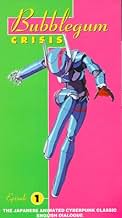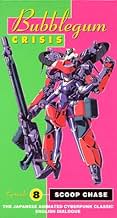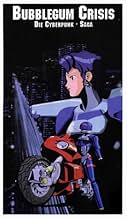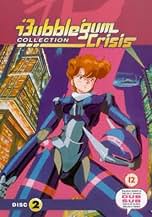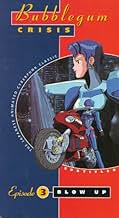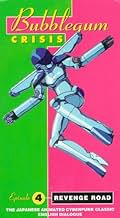VALUTAZIONE IMDb
7,3/10
1927
LA TUA VALUTAZIONE
Una squadra mercenaria femminile, armata con armature potenziate uniche, combatte le forze della mega-società corrotta Genom nella futuristica Tokyo.Una squadra mercenaria femminile, armata con armature potenziate uniche, combatte le forze della mega-società corrotta Genom nella futuristica Tokyo.Una squadra mercenaria femminile, armata con armature potenziate uniche, combatte le forze della mega-società corrotta Genom nella futuristica Tokyo.
Sfoglia gli episodi
Recensioni in evidenza
In a "Blade Runner" like future, four vigilante women - the Knight Sabers - assist the AD Police in fighting boomers, living machines not unlike the Replicants from "Blade Runner". The Knight Saber ring leader is Sylia Stingray, a rich, mysterious brunette who is the daughter of the man who created the boomers and whom might actually be a boomer herself. The others include rebellious biker girl Priss Asagiri, aerobics instructor Linna Yamazki and ADP computer hacker Nene. Other characters include ADP man Leon McNichol, a Brad Pitt like pretty boy with high ideals and a jerky attitude as well as a thing for Priss and with Leon is his hilarious partner Daley Wong. Oh and Sylia has a pervert whiz kid for a brother by name of Mackey. The villains include Quincy, chairman of GENOM, the company that produces the boomers, his right hand man Brian J. Mason (killed off too soon) and an obnoxious boomer man named Largo.
A good series overall, but being dated is the least of its problems. Originally slated for 13 episodes, it was cut short at episode 8, leaving many series plot threads unresolved. A sequel series, Bubblegum Crash, was concocted to solve this problem but it didn't help. Also the characters are never as well developed as you would like them to be. The most interesting character, the Knight Saber ringleader Sylia, is never completely explored. Linna had potential, but her subplot involving a friend who was apart of a mafia family was never resolved and most of the time Linna was just ignored. Nene was cute and funny but only had one episode to call her own, the last one. Sadly, most of the series attention was centered on Priss, who somehow became the most popular character of the series, so much in fact that although she was originally suppose to die, a fan backlash saved her; I think this was due partly to the fact that she was voiced by a then popular Japanese singer. But Priss herself was not that interesting of a character: all her episodes basically revolve around her seeking revenge for a minor character friend that we the audience sometimes didn't even get to know in depth. Priss became repetitive and dull after a certain point. I could never quite figure out what Leon saw in her.
But the series itself is not inherently bad. Animation is still pretty good in most of the eps (excluding the first one, which is a bit herky jerky, and the last one, in which the characters are drawn much too thinly) and it had an interesting theme on humanity VS technology.
Remade for TV as "Bubblegum Crisis Tokyo 2040" in 1999. Hate to say it, but 2040 was superior in many ways, though not completely perfect in and of itself.
A good series overall, but being dated is the least of its problems. Originally slated for 13 episodes, it was cut short at episode 8, leaving many series plot threads unresolved. A sequel series, Bubblegum Crash, was concocted to solve this problem but it didn't help. Also the characters are never as well developed as you would like them to be. The most interesting character, the Knight Saber ringleader Sylia, is never completely explored. Linna had potential, but her subplot involving a friend who was apart of a mafia family was never resolved and most of the time Linna was just ignored. Nene was cute and funny but only had one episode to call her own, the last one. Sadly, most of the series attention was centered on Priss, who somehow became the most popular character of the series, so much in fact that although she was originally suppose to die, a fan backlash saved her; I think this was due partly to the fact that she was voiced by a then popular Japanese singer. But Priss herself was not that interesting of a character: all her episodes basically revolve around her seeking revenge for a minor character friend that we the audience sometimes didn't even get to know in depth. Priss became repetitive and dull after a certain point. I could never quite figure out what Leon saw in her.
But the series itself is not inherently bad. Animation is still pretty good in most of the eps (excluding the first one, which is a bit herky jerky, and the last one, in which the characters are drawn much too thinly) and it had an interesting theme on humanity VS technology.
Remade for TV as "Bubblegum Crisis Tokyo 2040" in 1999. Hate to say it, but 2040 was superior in many ways, though not completely perfect in and of itself.
"Bubblegum Crisis." Those are words you hear said with reverence from just about every anime fan. It's one of those shows that inspired so many imitators and so many fans. When you hear so much good stuff about anything you really have to wonder if it can live up to the hype. In my opinion it does.
One thing that surprised me was just how much time was spent on characterization. While you hear mostly about the action, BGC does devote a good amount of time to its characters. Even one-shot characters like Irene Chang and Vision are well drawn. But the focus is on the Knight Sabers and each of them get at least one very good moment.
BGC also comes with an array of fun secondary characters like sleazy informant Fargo, who's always hitting on Sylia, cops Leon NcNickel and Daley Wong, Dr. Raven, and Slyia's perverted little brother Mackie. These guys also have their little moments and add some comic relief.
One thing that surprised me was that this show wasn't as dark as I'd expected it to be. You hear a lot of talk about how Mega Tokyo is really grim and gritty and stuff like that. But except for Genom running just about everything, Mega Tokyo doesn't seem that bad to me. It's really no worse than New York during a high crime year.
While it may look a little silly now, for 1985 BGC was really something big. Besides, what doesn't look goofy after fifteen years? In the end its formula of four really cute women, some really great mecha, good villains, cool VAs and some pretty decent music works. This is one for any anime fan.
One thing that surprised me was just how much time was spent on characterization. While you hear mostly about the action, BGC does devote a good amount of time to its characters. Even one-shot characters like Irene Chang and Vision are well drawn. But the focus is on the Knight Sabers and each of them get at least one very good moment.
BGC also comes with an array of fun secondary characters like sleazy informant Fargo, who's always hitting on Sylia, cops Leon NcNickel and Daley Wong, Dr. Raven, and Slyia's perverted little brother Mackie. These guys also have their little moments and add some comic relief.
One thing that surprised me was that this show wasn't as dark as I'd expected it to be. You hear a lot of talk about how Mega Tokyo is really grim and gritty and stuff like that. But except for Genom running just about everything, Mega Tokyo doesn't seem that bad to me. It's really no worse than New York during a high crime year.
While it may look a little silly now, for 1985 BGC was really something big. Besides, what doesn't look goofy after fifteen years? In the end its formula of four really cute women, some really great mecha, good villains, cool VAs and some pretty decent music works. This is one for any anime fan.
I like Scots. Hell, I am a Scot. But the guy above me is nuts. We all know that you can't just jump in the middle of a series. It's a cardinal sin of animé-watching, and something that will get you mocked mercilessly. And he did this.
The ep he's referring to is 'Revenge Road', and relies on you knowing who Priss, Linna, Nene, and Sylia are. Want to get a better picture of this animé without watching all eight episodes? Watch 5 and 6, 'Moonlight Rambler' and 'Red Eyes', respectively. You'll see some of the best drama, action, and plot to come out of animé ever.
/rant over.
Anyway, this is definitely worth a view. The premere babes-in-battlesuits animé, and home of the Knight Sabers (the most ass-kickin' group of mercs in animé.)
The ep he's referring to is 'Revenge Road', and relies on you knowing who Priss, Linna, Nene, and Sylia are. Want to get a better picture of this animé without watching all eight episodes? Watch 5 and 6, 'Moonlight Rambler' and 'Red Eyes', respectively. You'll see some of the best drama, action, and plot to come out of animé ever.
/rant over.
Anyway, this is definitely worth a view. The premere babes-in-battlesuits animé, and home of the Knight Sabers (the most ass-kickin' group of mercs in animé.)
The DVD set of this series is excellent. The sound is great, and the picture quality is perfect, even surpassing the laserdisc release. The ability to watch it in the original Japanese without subtitles covering the picture is nice, also. All 8 episodes are in the set, which is a steal at about $50 (compared to about $120 for the tapes, or around $100 for the laserdiscs, if you can even find them). My only complaint is that the music videos are compressed really badly, giving them an M-PEG look, and compared to how the actual episodes look in this set, that low quality is unacceptable. Still, that one complaint aside, this set is more than worth the money if you like this series even a little.
7vkn
Considering the large following and high reputation this series has, one imagines it must be quite good. Oddly, it never struck me as mind-blowingly fantastic as the fan hype makes it out to be, but I did quite like most of the series.
Many praises are sung about the soundtrack, and those are very true indeed; great rock songs with very good pace and vivid vocals accompany the action. They work a treat, and a lot of the songs stick with the viewer for very long.
Alas, the raving over the music is probably the only point where the hype got it right. For the rest, the actual series seems a bit underwhelming compared to what one might expect. For example, the supposedly excellent character development is a much-trumpeted point that falls a bit flat. Not to say that the characters are poor by any means. They're very likeable, and they do have their own distinct personalities, but they don't seem all that revolutionary. Our four heroines, Priss, Nene, Sylia and Linna basically consist of respectively the tough rebellious youth, the pink-haired girly "cute" computer whiz, the mysterious and only -really- interesting one, and...err, the other one (yup, poor Linna is badly under-used and shows very little distinct character traits). It's true that this is a cast formula that was innovative for it's time, and that it has been copied very often, but maybe that's exactly why the whole thing sometimes seems a little below it's reputation. There are tough, rebellious youths and pink-haired squeaky cute computer geniuses all over the place on the anime market. The fact that they're all female is hardly a novelty anymore either.
That might be the main problem here; time hasn't been too kind to Bubblegum Crisis. Those who first saw the series and became loyal followers in the 80's had every reason to be impressed back then. Alas, by now, the same formula has appeared so often, be it under different guises, that there's little left to be amazed about for one watching this series for the first time now. Somehow BGC doesn't really manage to hold up a feeling that it's the founding father of a whole generation of anime series.
Animation quality has aged a bit better though, with only the first episode looking genuinely old hat by now. Episodes seven and eight are still lovely to look at (probably due to the nice and somehow "softer" color palette used for ep. 8). The mecha action scenes -another highly hyped point- are indeed fast and furious, and have some very intense moments. The mecha designs as well are admirably intricate and innovative sometimes. But like most over-hyped elements of BGC, the fights have flaws as well, namely that they are sometimes cut short a bit. The way the main villain in the sixth episode (who is utterly brilliant, by the way) is finished off struck me as rather too sudden, as was the end of the battle in episode 5. It's supposed to be a very dramatic moment, but it went a bit too fast and thus didn't have all the punch it -could- have had.
There still is lots going in favor of BGC, however. Several minor characters are very likeable and amusing, and manage to actually be more entertaining than the four heroines. The adorable Daley springs to mind, not exactly because he's gay -homosexuality is very common in anime- but because during his few moments in the spotlight he's always delightful (and damn it all, he's -cute-). Most of the one-shot characters that only appear in one or two episodes are also handled with style and become very vivid. A very nice bunch, basically. And that goes for the minor nasties as well. The four heroines are also entertaining enough, despite not being all that full of surprises.
The storyline also manages to present some interesting themes. Revenge is one of them, as is the blurred borderline between machines and living beings. There's also a very intriguing triangle between Sylia, minor nasty Mason and more impressive nasty Largo. There are also hints that Sylia might be more than meets the eye. All these themes and possible subliminar messages are only established in the background and hardly ever mentioned in so many words. One could very easily miss them altogether.
Subtelty is all very well, but it's a shame that none of these possible deeper plot threads are ever tied up; the end of episode 8 is -not- a proper ending. The series was supposed to continue on for a few more episodes, but alas the project ran into murky waters at that point. And that's why BGC is so tricky to judge; it's an unfinished piece (a sequel tried to sort of tie everything up but didn't really succeed). It's as if Return of the Jedi was missing from the first Star Wars trilogy, for instance. And that's quite a shame, as the -promise- certainly is there.
If the series had lived to see it's originally planned ending, it might have become the masterpiece it's -said- to be. As it stands, it's a good, solid series with plenty to enjoy and a few flaws that don't get in the way too much. Give it a go, see what you think. You probably won't be blown over with amazement, but chances are high you'll have a very plain good time all the same.
(just note that you should avoid the dub if possible. It's tolerable, but the songs are dubbed as well, and as a result suffer overall. Besides, dubs are always inferior to the original)
Many praises are sung about the soundtrack, and those are very true indeed; great rock songs with very good pace and vivid vocals accompany the action. They work a treat, and a lot of the songs stick with the viewer for very long.
Alas, the raving over the music is probably the only point where the hype got it right. For the rest, the actual series seems a bit underwhelming compared to what one might expect. For example, the supposedly excellent character development is a much-trumpeted point that falls a bit flat. Not to say that the characters are poor by any means. They're very likeable, and they do have their own distinct personalities, but they don't seem all that revolutionary. Our four heroines, Priss, Nene, Sylia and Linna basically consist of respectively the tough rebellious youth, the pink-haired girly "cute" computer whiz, the mysterious and only -really- interesting one, and...err, the other one (yup, poor Linna is badly under-used and shows very little distinct character traits). It's true that this is a cast formula that was innovative for it's time, and that it has been copied very often, but maybe that's exactly why the whole thing sometimes seems a little below it's reputation. There are tough, rebellious youths and pink-haired squeaky cute computer geniuses all over the place on the anime market. The fact that they're all female is hardly a novelty anymore either.
That might be the main problem here; time hasn't been too kind to Bubblegum Crisis. Those who first saw the series and became loyal followers in the 80's had every reason to be impressed back then. Alas, by now, the same formula has appeared so often, be it under different guises, that there's little left to be amazed about for one watching this series for the first time now. Somehow BGC doesn't really manage to hold up a feeling that it's the founding father of a whole generation of anime series.
Animation quality has aged a bit better though, with only the first episode looking genuinely old hat by now. Episodes seven and eight are still lovely to look at (probably due to the nice and somehow "softer" color palette used for ep. 8). The mecha action scenes -another highly hyped point- are indeed fast and furious, and have some very intense moments. The mecha designs as well are admirably intricate and innovative sometimes. But like most over-hyped elements of BGC, the fights have flaws as well, namely that they are sometimes cut short a bit. The way the main villain in the sixth episode (who is utterly brilliant, by the way) is finished off struck me as rather too sudden, as was the end of the battle in episode 5. It's supposed to be a very dramatic moment, but it went a bit too fast and thus didn't have all the punch it -could- have had.
There still is lots going in favor of BGC, however. Several minor characters are very likeable and amusing, and manage to actually be more entertaining than the four heroines. The adorable Daley springs to mind, not exactly because he's gay -homosexuality is very common in anime- but because during his few moments in the spotlight he's always delightful (and damn it all, he's -cute-). Most of the one-shot characters that only appear in one or two episodes are also handled with style and become very vivid. A very nice bunch, basically. And that goes for the minor nasties as well. The four heroines are also entertaining enough, despite not being all that full of surprises.
The storyline also manages to present some interesting themes. Revenge is one of them, as is the blurred borderline between machines and living beings. There's also a very intriguing triangle between Sylia, minor nasty Mason and more impressive nasty Largo. There are also hints that Sylia might be more than meets the eye. All these themes and possible subliminar messages are only established in the background and hardly ever mentioned in so many words. One could very easily miss them altogether.
Subtelty is all very well, but it's a shame that none of these possible deeper plot threads are ever tied up; the end of episode 8 is -not- a proper ending. The series was supposed to continue on for a few more episodes, but alas the project ran into murky waters at that point. And that's why BGC is so tricky to judge; it's an unfinished piece (a sequel tried to sort of tie everything up but didn't really succeed). It's as if Return of the Jedi was missing from the first Star Wars trilogy, for instance. And that's quite a shame, as the -promise- certainly is there.
If the series had lived to see it's originally planned ending, it might have become the masterpiece it's -said- to be. As it stands, it's a good, solid series with plenty to enjoy and a few flaws that don't get in the way too much. Give it a go, see what you think. You probably won't be blown over with amazement, but chances are high you'll have a very plain good time all the same.
(just note that you should avoid the dub if possible. It's tolerable, but the songs are dubbed as well, and as a result suffer overall. Besides, dubs are always inferior to the original)
Lo sapevi?
- QuizThere are many references to Blade Runner:
- The band is called "The Replicants";
- The general mission in both is to kill androids who are almost too human;
- There happen to be characters named Leon and Priss in both;
- Both feature a huge, pyramid-shaped building.
- Citazioni
Priscilla S. Asagiri "Priss": You little idiot! If you die, what will Sylvie have died for?
- ConnessioniEdited into Baburugamu kuraishisu hariken raibu! 2032 (1988)
- Colonne sonoreKonya Wa Hurricane
(There's a Hurricane Tonight)
Lyrics by Tomoko Aran (as Aran Tomoko)
Music by Kisaburô Suzuki (as Suzuki Kisaburoo)
Arranged by Nakashima Masao
Performed by Kinuko Ômori (as Oomori Kinuko)
English Performance by Joyce Leigh Bowden
I più visti
Accedi per valutare e creare un elenco di titoli salvati per ottenere consigli personalizzati
- How many seasons does Bubblegum Crisis have?Powered by Alexa
Dettagli
Contribuisci a questa pagina
Suggerisci una modifica o aggiungi i contenuti mancanti

Divario superiore
By what name was Baburugamu kuraishisu (1987) officially released in India in English?
Rispondi
